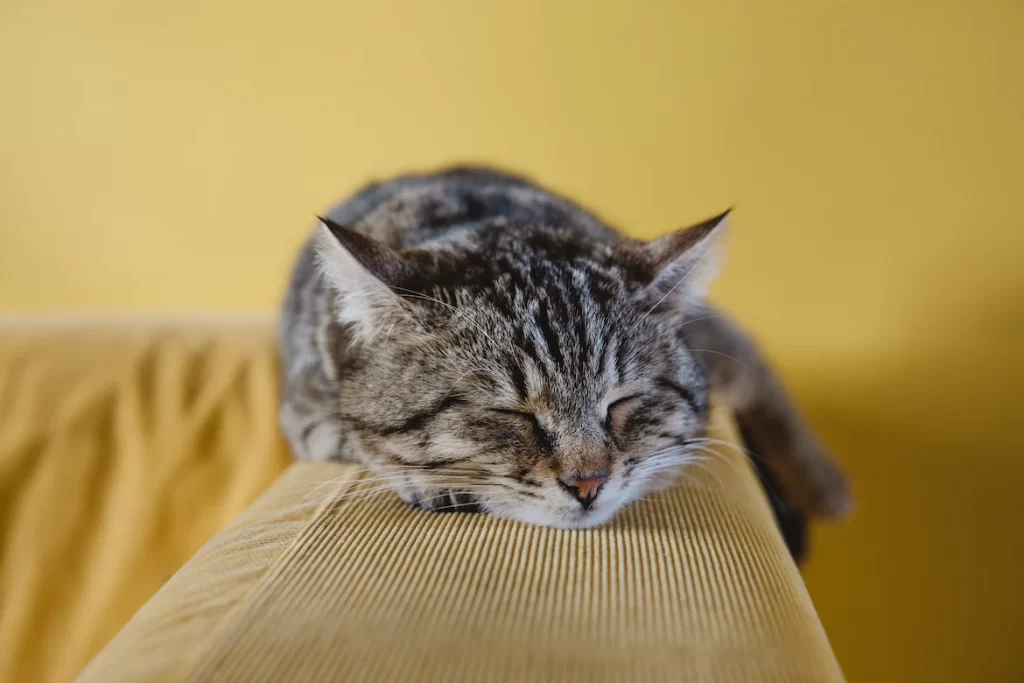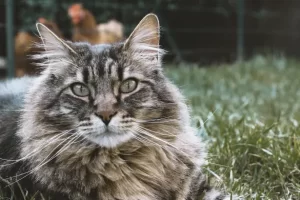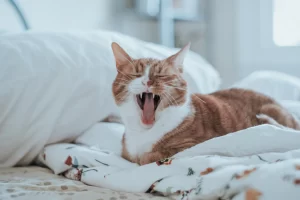
Do Cats Dream About Their Owners?
One of the most popular questions asked by cat owners is whether or not their feline family has dreams. How often do cats consider or dream about humans? Since we don’t know what happens in a cat’s brain while asleep, we can’t provide a definite answer to this question. According to an online survey conducted by American Psychological Association, cats are certainly capable of dreaming, and these dreams may contain reflections about their owners.
Cats sleep more distinctly than humans, which is the starting point for any discussion on whether or not cats have dreams. Cats spend substantially less time in the deep non-REM sleep cycles that are conducive to dreaming and have a lot faster onset to REM (rapid eye movement) sleep. There isn’t enough evidence to say whether or not cats have dreams like humans. Still, some researchers have hypothesized that cats might have fleeting mental images during sleep because of their shorter cycles and the increased activity of their brains during slumber.
Also, domestic house cats are typically very devoted pets who depend heavily on their owners for food and shelter, so it’s not out of the question that cats occasionally spend their dreams thinking warm and fuzzy thoughts about their owners as they snooze. However, unless more research is done on the topic, any conclusions formed here will remain purely speculative rather than factual, as there is no way to directly ask a cat what it has dreamed about or witness which exact images flash through its head during nights’ rest.
However, from an evolutionary perspective, it makes sense why such species would form deep attachments with human guardians over generations. This may explain why many pet parents are convinced that their cats dream every night.
Can The Owner Tell When The Cat Is Dreaming?
An owner cannot tell when their cat is dreaming. Dreaming in cats happens during the rapid eye movement (REM) stage of sleep and looks similar to REM in humans: eyes move rapidly beneath closed lids, and muscles twitch or jerk periodically. Breathing may become shallow and irregular for a few seconds at a time. However, an owner can’t differentiate between physiological activity associated with normal sleep cycles or true dream states without directly monitoring brain wave patterns, which requires specialized equipment that most owners do not have access to.
Do Different Breeds Of Cats Have Different Dreams?
Different cat breeds dream differently. Cat REM sleep patterns vary by breed and temperament. Due to their increased energy levels, domestic shorthair cats dream more often than other domestic cats. In contrast, Bengal or Siamese may dream for longer periods with strong motions like twitching or vocalizing during their nighttime sleep. These breeds may fantasize about chasing prey like they do when awake. If a breed was constantly exposed to water play, it might fantasize about swimming with fish.
Are Dreams Of A Kitten Different To That Of An Adult?
The dreams of a kitten will usually revolve around playfulness and curiosity. Kittens are typically energetic and may dream about chasing things or exploring new surroundings. They might even envision themselves playing with their owners in the home or outside in nature. Their dreams could also involve being petted and cuddled by their owners, showing that kittens often love to be close to people who care for them deeply.
Unlike kittens, an adult cat’s dreams can become more complex as it ages due to its increased understanding of the world. Adult cats may have more meaningful connections with their human companions than young ones; therefore, these types of cats tend to dream about spending time together with those closest to them — cuddling on laps while purring contentedly or resting near each other peacefully during naps throughout the day. Additionally, adult cats may imagine catching prey out in nature or getting into mischief like knocking items off shelves at home when no one is paying attention — demonstrating how much they still enjoy life despite having aged over time.
Are Cats & Human Dreams Similar?
It’s impossible to determine if cats dream like humans. There are certain similarities between the two that show cats dream in the same manner. Like humans, cats experience REM sleep. Most vivid dreams occur during this stage of sleep. Thus, cats may also dream during this time. Other physiological similarities between cats and humans during sleep may suggest that cats have comparable dreams. REM sleep causes muscle twitches and body movements in cats and humans. This may be the body’s response to dream visuals. So while we don’t know if cats dream like humans, some features imply they do. Given the similarities, cats may dream of pictures, feelings, and stories like humans.
How Can Owners Help Cats Have Pleasant Dreams?
Owners can help cats have pleasant dreams by creating a peaceful and comfortable sleeping environment. Cats should have a comfortable bed or blanket in a quiet, safe place to relax and sleep without interruption.
The bed should be placed away from windows, doors, and noise sources such as TVs or traffic. Owners can also provide calming companionship to their cats before bedtime. This could include brushing their fur, providing treats, or playing with them. Owners can also help cats relax by providing them with a warm water bottle or heating pad to sleep on. Alternatively, owners can create a relaxing atmosphere with calming music or white noise. If a cat is prone to nightmares, owners can try calming supplements or herbal teas that may help them sleep more peacefully. Lastly, owners should give their cats plenty of exercise during the day, so they are tired enough to sleep soundly.
Factors influencing cat’s dream
Psychological Factors
- Attachment/Relationship
It is believed that if a cat has a strong attachment to its human companion, then this relationship might manifest within its dreaming brain activity, meaning cats could dream about interactions between themselves and owners.
- Memories
Similar to how we dream about past experiences during REM sleep cycles, cats’ brains also replay positive and negative memories while sleeping, influencing what type of dreams they will have. The more meaningful an experience is for them, such as playing with their favorite toys or spending time outdoors with the owner.
- Stress
Cats, like humans, can experience stress that can affect their dreams’ quality and content. When cats are under a lot of physical or psychological pressure from unfamiliar environments or dealing with changes to their routine, they may have nightmares that involve dangerous situations that trigger fear responses.
Behavioral factors
Cats are very social creatures and form strong bonds with their owners. As a result, the behavior of cats towards their owners can affect what kind of dreams they have about them. If a cat is affectionate and shows love for its owner often, it will likely dream positively about that person; however, if the cat is distant or aloof, it may not be as positive in its thoughts about the owner. Additionally, how much interaction a cat has with its owner can also affect what type of dreams occur; cats who spend more time playing together or engaging in activity are more likely to experience pleasant dreams than those who do not get enough quality time with their humans.
Physiological factors
- Physiological arousal
When cats dream about their owners, they typically become physiologically aroused due to the pleasant dream content. This may include signs such as purring, twitching muscles or whiskers, and vocalizations in their sleep. All these responses indicate that the cat is having a positive experience associated with its owner during this dream state.
- Memory recall
Cats have excellent memories of associating certain people and places with positive experiences like being around their owners! During REM sleep, cats will often access those memories, which can manifest themselves into dreams featuring either real-life scenarios or made-up ones involving the beloved human in question.
- Hormones
A cat’s physiological state is largely determined by its hormones, such as cortisol, oxytocin, and dopamine, all of which are involved in producing emotions like pleasure, fear, reward, and love that could influence a cat’s dreaming experience when it comes to thoughts about his or her human companion.
Are there benefits associated with a cat’s dreaming?
Cats dreams about their owners who can provide their cats with comfort and security. When cats have an owner they are familiar with, it provides them with safety, knowing that someone is there for them if anything happens. This feeling of protection carries over into their sleep, where they dream about being around or interacting with this person who gives them such assurance when awake.
Dreaming about their owners also allows cats to explore different aspects of relationships and learn more behaviors from each other while asleep without any risk of danger or harm occurring due to play-fighting, like what could happen during waking hours between pets and humans alike. Knowing that its owner cares for it deeply helps build strong bonds that will continue even when separated physically by distance, making dreaming all the more important since physical contact cannot always be achieved easily. However, emotional connection through shared experiences still holds regardless if done so while sleeping!
Dreams help strengthen memories which may lead to improved learning potentials, too; cats might remember better how certain commands sound after experiencing similar scenarios multiple times within one night’s worth of restful slumber – as much research has already been conducted on animals showing positive effects associated with recalling past events (in this case: interactions between pet & human) via reoccurring dream patterns throughout various phases throughout REM cycles experienced by mammals including felines themselves.
Conclusion
Cats love and trust their caregivers. Cats dream during REM sleep, much like humans. The brain stores memories from the day before during this time. While it’s hard to tell what your cat dreams about in REM sleep, research suggests that felines can retain visions of their loved ones and other animals they interact with daily, such as your pets. Cats, like humans, may “dream up” imaginative scenarios like flying through space or meeting talking animals. Anecdotal evidence suggests cats may occasionally have these dreams, depending on how relaxed they are around you and their environment. Yes, cats dream about their owners, but we don’t know what they think.


